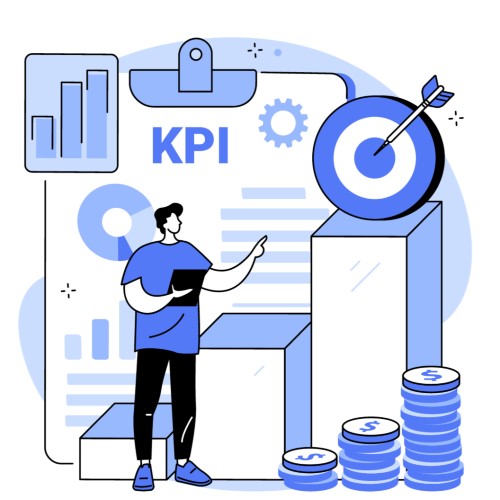Understanding Accounting KPIs
Success hinges on not only making informed decisions but also continuously monitoring and optimizing performance. One essential tool in this process is the use of Key Performance Indicators (KPIs). This is where accounting firms play a pivotal role by assisting their clients in assessing financial health and strategizing for growth by using accounting KPIs.

Key Performance Indicators, or KPIs, are quantifiable metrics that gauge an organization’s performance in various areas critical to its success. They are specific, measurable, achievable, relevant, and time-bound, which makes them invaluable for decision-making and goal setting. In the context of accounting, KPIs can provide insights into financial stability, profitability, efficiency, and other aspects of a business’s operations.
The Role of Accounting Firms
Accounting firms serve as trusted advisors to businesses, offering a range of financial services that include bookkeeping, tax service, auditing, and financial analysis. Among their various responsibilities, tracking and analyzing KPIs for clients is increasingly crucial. Here’s how accounting firms use KPIs on behalf of their clients:
- Financial Health Assessment: One of the primary objectives of an accounting firm is to assess the financial health of their client’s business. They do this by examining KPIs like liquidity ratios, profitability margins, and debt-to-equity ratios. These metrics help clients understand their financial standing and make informed decisions regarding investments, expansion, or cost-cutting measures.
- Performance Benchmarking: KPIs allow accounting firms to benchmark their clients’ performance against industry standards and competitors. This benchmarking provides valuable insights into areas where clients may need improvement or where they excel. It helps in setting realistic performance goals and strategies for growth.
- Cash Flow Management: Managing cash flow is critical for business sustainability. Accounting firms use KPIs like the cash conversion cycle and days sales outstanding to help clients optimize their cash flow. This ensures that there is enough liquidity to cover expenses and invest in growth opportunities.
- Cost Control and Efficiency: KPIs related to cost control, such as the cost-to-income ratio or the efficiency ratio, assist clients in identifying areas where they can reduce costs and improve operational efficiency. This, in turn, can lead to higher profitability.
- Forecasting and Planning: KPIs are invaluable in forecasting future financial performance. Accounting firms help clients create budgets and financial forecasts based on historical data and relevant KPIs. This forward-looking analysis guides decision-making and long-term planning.
Conclusion
Key Performance Indicators are indispensable tools for accounting firms working on behalf of their clients. They empower businesses to make data-driven decisions, maintain compliance, and achieve financial stability. Accounting firms play a pivotal role in tracking and analyzing KPIs, providing clients with the insights needed to thrive in an ever-changing business landscape. As technology continues to advance, we can expect accounting firms to leverage data analytics and automation to further enhance their KPI-driven services, ultimately contributing to the success of their clients.